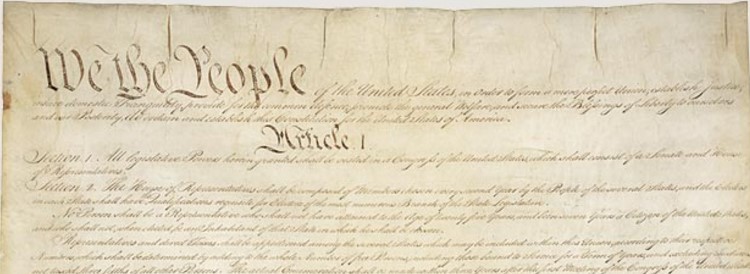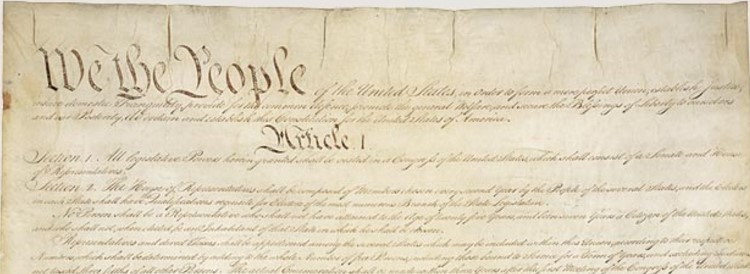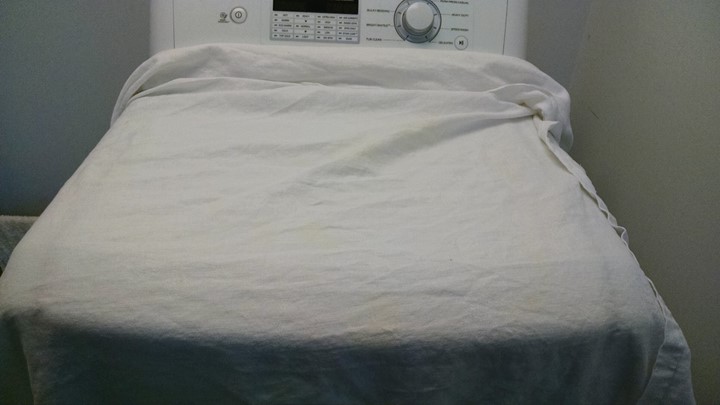(Standard disclaimer. I’m a layman with a high school education)
The House of Representatives shall be composed of Members chosen every second Year by the People of the several States, and the electors in each State shall have the qualifications requisite for electors of the most numerous branch of the State legislature. No Person shall be a Representative who shall not have attained to the Age of twenty five Years, and been seven Years a citizen of the United States, and who shall not, when elected, be an Inhabitant of that State in which he shall be chosen.
This passage says several things. First, that the people will vote for their Representatives, and that they will elect them every two years. Secondly, this gives the qualification to vote to the states. So, it was conceivable that a resident of Massachusetts could move to Virginia and find he was no longer qualified to vote! (The framers of the US Constitution simply did not believe in universal franchise). This matter was eventually addressed over several amendments.
Then this moves on to the qualifications to be a US Representative. You have to have been a US Citizen for at least seven years, be at least twenty-five years old, and be a resident of the state in which you are elected.
Representatives and direct Taxes shall be apportioned among the several States which may be included within this Union, according to their respective Numbers, which shall be determined by adding to the whole number of free Persons, including those bound to Service for a Term of Years, and excluding Indians not taxed, three fifths of all other Persons. The actual Enumeration shall be made within three Years after the first Meeting of the Congress of the United States, and within every subsequent Term of ten Years, in such Manner as they shall by law Direct. The number of Representatives shall not exceed one for every thirty Thousand, but each State shall have at least one Representative; and until such enumeration shall be made, the State of New Hampshire shall be entitled to chuse three, Massachusetts eight, Rhode Island and Providence Plantations one, Connecticut five, New York six, New Jersey four, Pennsylvania eight, Delaware one, Maryland six, Virginia ten, North Carolina five, and Georgia three.
Oh goodie, we get to something problematic right away.
Representatives and taxation were meant to be based on population. However, there was a large population of people living within the borders of the US that some of the framers most certainly did not want to count as a citizen – Native Americans and enslaved people. Yet they still didn’t want to give up that enumeration! People were afraid that the high population density areas would address their own needs and roll over the needs of areas with lower population density. If you read the news this very morning, you’ll see that this is an issue we still wrestle with!
The compromise was that the people who were enslaved would count as three fifths of a person (and yes I wince to write that) and if a Native American was not taxed, they didn’t count at all. (And there we go with taxation without representation, ’cause Native Americans weren’t universally considered US citizens until the 1920s) A lot of this has been addressed by legislation and Amendments, by the way.
It also establishes that we need to count our population every ten years. We do this with the US Census.
This directs that we cannot have more than one representative for every thirty thousand people, and gives a number of representatives for several of the states as an interim until the first Census. Keep in mind, they were making this up as they went along!
When vacancies happen in the Representation from any State, the Executive Authority thereof shall issue Writs of Election to fill such Vacancies.
The House of Representatives shall chuse their Speaker and other Officers; and shall have the sole Power of Impeachment.
If a seat in the House of Representatives becomes vacant, the state governor is responsible for organizing and election to fill that vacancy.
Within the House, the members choose the Speaker of the House as well as any other leadership positions with the body. They’re also responsible for impeaching their own members if necessary. (Quis custodiet)
One of the things that is really striking me as I am going along with this is how dynamic the Constitution is. We have changed so much over the last couple of centuries. Does this mean the document is meaningless? No. Not in the least. While I do think we do need to work from principles, the continent-spanning empire we have now genuinely does have different needs than did those East Coast colonies.


 I overbought majorly on the aran weight cream colored wool for a sweater I made back at the beginning of the year.
I overbought majorly on the aran weight cream colored wool for a sweater I made back at the beginning of the year.


